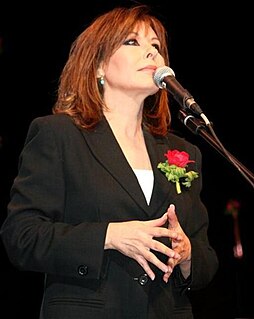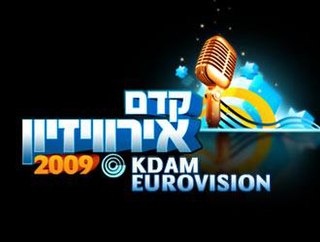
The Eurovision Song Contest 1979 was the 24th edition of the annual Eurovision Song Contest. It took place in Jerusalem, Israel, following the country's victory at the 1978 contest with the song "A-Ba-Ni-Bi" by Izhar Cohen and the Alphabeta. Organised by the European Broadcasting Union (EBU) and host broadcaster Israeli Broadcasting Authority (IBA), the contest was held at the International Convention Centre on 31 March 1979 and was hosted by Israeli television presenter Daniel Pe'er and singer Yardena Arazi. This was the first time that the Eurovision Song Contest was held outside Europe.
Israel participated in the Eurovision Song Contest 2006 with the song "Together We Are One" written by Orly Burg, Osnat Zabag and Eddie Butler. The song was performed by Eddie Butler, who had previously represented Israel in the Eurovision Song Contest in 1999 as part of the band Eden where they placed fifth with the song "Yom Huledet". The Israeli entry for the 2006 contest in Athens, Greece was selected through the national final Kdam Eurovision 2006, organised by the Israeli broadcaster Israel Broadcasting Authority (IBA). The competition took place on 15 March 2006 and featured eleven entries. "Ze Hazman" performed by Eddie Butler emerged as the winner after achieving the highest score following the combination of votes from four regional juries, an audience vote and a public vote. The song title was later translated from Hebrew to English for the Eurovision Song Contest and was titled "Together We Are One".

Yardena Shulamit Arazi is an Israeli singer and entertainer.

The Kdam Eurovision in short known as the Kdam was the Israeli national preselection of the Eurovision Song Contest. The competition was first introduced in 1981 and ran until 2014.
Israel participated in the Eurovision Song Contest 2007 with the song "Push the Button" written by Kobi Oz. The song was performed by the band Teapacks, which was internally selected by the Israeli broadcaster Israel Broadcasting Authority (IBA) in January 2007 to compete at the 2007 contest in Helsinki, Finland. The song Teapacks would perform at Eurovision was selected through the national final Kdam Eurovision 2007 which took place on 27 February 2007 that featured four songs. "Push the Button" emerged as the winning song after achieving the highest score following the combination of votes from an eleven-member jury panel, an online vote and a public vote.
Israel participated in the Eurovision Song Contest 2008 with the song "The Fire in Your Eyes" written by Dana International and Shay Kerem. The song was performed by Boaz Ma'uda, who was internally selected by the Israeli broadcaster Israel Broadcasting Authority (IBA) in collaboration with the commercial broadcaster Keshet in November 2007 to compete at the 2008 contest in Belgrade, Serbia, The song Ma'uda would perform at Eurovision was selected through the national final Kdam Eurovision 2008 which took place on 15 March 2010 that featured five songs. "Ke'ilu Kan" emerged as the winning song after achieving the highest score following the combination of votes from two regional juries, two thematical jury groups, a jury panel and a public vote. The song title was later translated from Hebrew to English for the Eurovision Song Contest and was titled "The Fire in Your Eyes".
Israel entered the Eurovision Song Contest 1992 with the song "Ze Rak Sport" by Dafna Dekel after she won the Israeli national final.
Israel participated in the Eurovision Song Contest 2009 with the song "There Must Be Another Way" written by Noa, Mira Awad and Gil Dor. The song was performed by Noa and Mira Awad, who were internally selected by the Israeli broadcaster Israel Broadcasting Authority (IBA) in January 2009 to compete at the 2009 contest in Moscow, Russia. The song Noa and Awad would perform at Eurovision was selected through the national final Kdam Eurovision 2009 which took place on 2 March 2009 that featured four songs. "Einaiych " emerged as the winning song after achieving the highest score following the combination of votes from two regional juries, a jury panel and a public vote.
Switzerland competed at the Eurovision Song Contest 1988, held in Dublin, Ireland.
Israel participated in the Eurovision Song Contest 2010 with the song "Milim" written by Tomer Hadadi and Noam Horev. The song was performed by Harel Skaat, who was internally selected by the Israeli broadcaster Israel Broadcasting Authority (IBA) in collaboration with the commercial broadcaster Reshet in December 2009 to compete at the 2010 contest in Oslo, Norway. The song Skaat would perform at Eurovision was selected through the national final Kdam Eurovision 2010 which took place on 15 March 2010 that featured four songs. "Milim" emerged as the winning song after achieving the highest score following the combination of votes from four thematical jury groups, a jury panel and a public vote.
Israel participated in the Eurovision Song Contest 2011 with the song "Ding Dong" written and performed by Dana International, who had previously represented Israel in the Eurovision Song Contest in 1998 where she won the contest with the song "Diva". The Israeli entry for the 2011 contest in Düsseldorf, Germany was selected through the national final Kdam Eurovision 2011, organised by the Israeli broadcaster Israel Broadcasting Authority (IBA). The competition took place on 8 March 2011 that featured ten entries. "Ding Dong" performed by Dana International emerged as the winner after achieving the highest score following the combination of votes from three thematical jury groups, a twelve-member jury panel and a public vote.
Israel participated in the Eurovision Song Contest 2012 with the song "Time" written by Ran Shem-Tov and Shiri Hadar. The song was performed by the band Izabo, which was internally selected by the Israeli broadcaster Israel Broadcasting Authority (IBA) to compete at the 2012 contest in Baku, Azerbaijan. Izabo and the song "Time" were announced as the Israeli entry on 7 February 2012. The song was presented to the public on 1 March 2012.
Israel returned at the Eurovision Song Contest 1981 held in Dublin, Ireland, after withdrawing from the 1980 contest because of National Day of Remembrance.
Israel participated in, hosted, and won the 1979 Eurovision Song Contest, which was held on 31 March 1979 at the International Convention Center's Ussishkin Auditorium in Jerusalem. Their entry, "Hallelujah," was composed by Kobi Oshrat, written by Shimrit Orr, and performed by Milk and Honey.
Israel was present at the 1983 Eurovision Song Contest, which was held in Munich, Germany. Their entry was "Hi", written by Ehud Manor, composed by the previous year's Israeli representative Avi Toledano, and performed by Ofra Haza. The song was selected through Israel's traditional national final, the Kdam Eurovision.
Israel participated in the Eurovision Song Contest 2017. Israeli broadcaster Israel Broadcasting Authority (IBA) collaborated with the commercial broadcaster Keshet and Tedy Productions which organised the reality singing competition HaKokhav HaBa L'Eurovizion to select the singer. The winner of the Israeli national selection was Imri Ziv and a committee of the Israeli broadcaster internally selected for him the song "I Feel Alive" written by Dolev Ram and Penn Hazut. The song was presented to the public on 13 March 2017.
Israel was present at the 1987 Eurovision Song Contest, which was held at the Palais du Centenaire in Brussels, Belgium. Their entry was "Shir Habatlanim", written and composed by Zohar Laskov and performed by actor-comedians Natan Datner and Avi Kushnir, who dubbed themselves the Lazy Bums. The song was selected through Israel's traditional national final, the Kdam Eurovision.
Israel entered the Eurovision Song Contest 1993 with the song "Shiru" by Lehakat Shiru after they won the Israeli national final, Kdam Eurovision.
Israel participated in the Junior Eurovision Song Contest 2018 which took place on 25 November 2018, in Minsk, Belarus. The Israeli broadcaster Israeli Public Broadcasting Corporation (KAN) was responsible for organising their entry for the contest. This is Israel's third appearance at the Junior Eurovision Song Contest.
Israel entered the Eurovision Song Contest 1995 with the song "Amen" by Liora after she won the Israeli national final.


